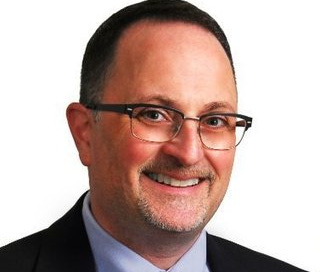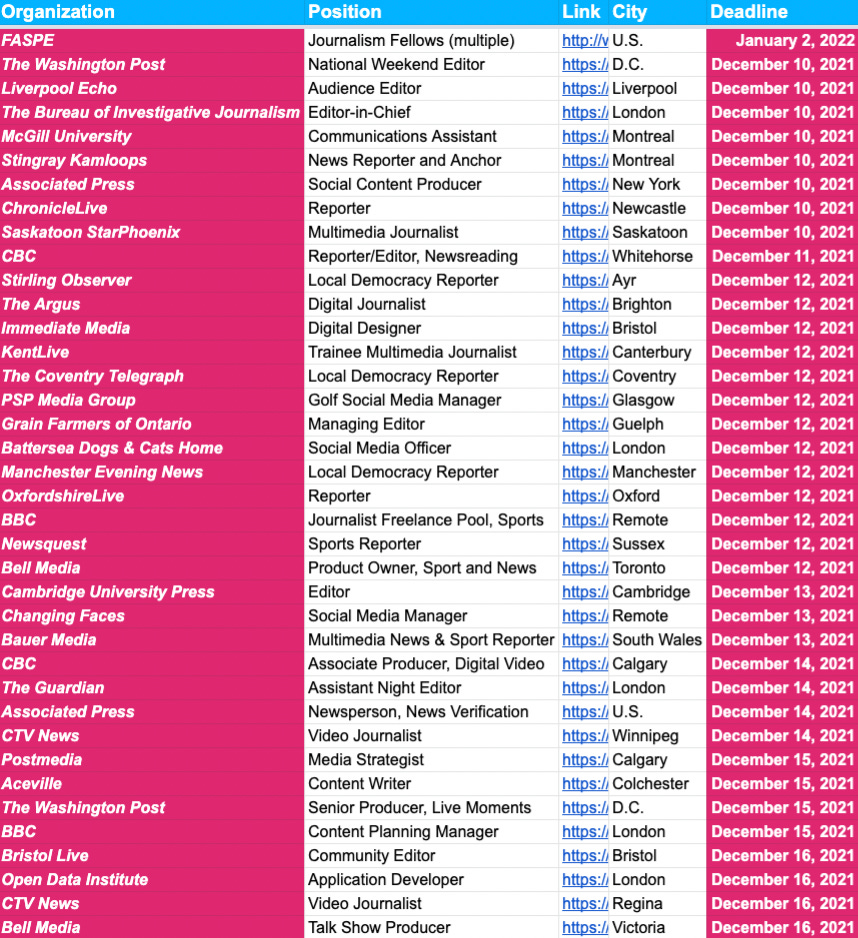🗞️ Selling Your Portfolio w/ Paul Albergo (Bloomberg Industry)
"The best cover letters acknowledge what an employer is looking for in a candidate and offers an example or anecdote that illustrates you have that. Remember: Show, don’t tell."
Hello folks, happy Friday! Another week in the books and one closer to the much-needed holiday break. Until then, we have another really great Q&A for you today, as we welcome in Paul Albergo, Executive Editor of Bloomberg Industry.
Paul started out as a reporter with Bloomberg Industry in 1986 (!) — Paul assured me I can’t make him feel older than he already is — and has risen through the newsroom all the way to executive editor, where a large part of his job revolves around recruiting the best talent for the future.
In our Q&A, Paul outlined what he looks for when recruiting reporters and editors, the dos and don’ts of cover letters and applications, and ultimately how to sell yourself so you stand out from the rest of the field. And Paul is hiring right now — you can see all of his current openings here.
If you find any of today’s advice and content helpful, please do consider passing it on to your friends, students and colleagues. 🙏
Be sure to also check out Monday’s new jobs, where we added another 700+ openings in the U.S., UK and Canada. And we’ll have another bumper update this coming Monday as well.
Upcoming deadlines and today’s thought of the day are below. Enjoy today’s newsletter and your weekends. Bye for now. 👋
Thought of the Day 🤔
“Job seeking can feel like a solo endeavor, but it really is a team sport. Seek out others for help and guidance. Tap into your school’s alumni network. Set up informational interviews, especially at companies where you want to work. Lean on friends and colleagues for leads and advice. Just don’t do it alone.” — Paul Albergo
Job Corner ✍️
We have hundreds of deadlines listed on the job board over the next seven days. Below are some of them. Subscribe below for the full amount!👇
🙋If you’re an editor with new openings, fill out this form and we’ll get those jobs added to the board 🙋♂️
🚨If you’re a paying subscriber, your jobs sheet link remains the same each week🚨
Preview of Upcoming Deadlines 🇺🇸🇬🇧🇨🇦
Introducing Paul Albergo 👋
Daniel: Hey Paul, welcome. Hope you had a restful Thanksgiving and may long the good vibes continue as we approach the holiday break!
Paul: Thanks for having me, Daniel! I had a lovely trip to Chicago to visit my son, and am now ready to answer some questions!
Daniel: Ha, that’s great to hear. Well let’s get straight to it then. What are the most important things to you when evaluating a candidate’s portfolio?
Paul: Clips. For me, it’s all about clips. Do you have a good variety? Can you point to breaking stories where you were first? Do you have stories that wouldn’t have otherwise been told if you didn’t tell them? Do you have source-rich features? Data stories? Scoops? These are the things that make a candidate stand out to me.
Your past work is an indicator of the kind of journalist you are. Make sure to use your work to highlight your strengths. Curate your stories and make sure you’re showcasing clips that show you in the best light.
Daniel: Job hunting is daunting and draining. We’ve all been there — trying to pump out as many applications each day as possible. What are some of the most common things applicants don’t do that put them at a disadvantage?
Paul: A lot of folks don’t take the time to think about their own story. We’re paid to tell stories, but we often are not good at telling our own. The best candidates are those who have spent time thinking about their story: Why do I deserve this particular job? What skills, accomplishments and successes do I bring to the table? Do my resume, cover letter and clips tell that story? And am I prepared to build upon that in an interview?
“The best cover letters acknowledge what an employer is looking for in a candidate and offers an example or anecdote that illustrates you have that. Remember: Show, don’t tell.”
Daniel: Cover letters were always my biggest fear and I dreaded writing them. What the heck can I write that’s not already in my portfolio and CV/résumé?
Paul: A cover letter should serve as a bridge between the job description and your resume and portfolio. The best cover letters acknowledge what an employer is looking for in a candidate, and offers an example or anecdote that illustrates you have that. Remember: Show, don’t tell.
If a job ad calls for an inquisitive and versatile journalist, don’t just parrot the words by calling yourself inquisitive and versatile. Talk about a story that illustrates how inquisitive and versatile you are. If an employer says you need to know how to use Excel or a similar app, then talk about how you use that app.
It sounds obvious when I write it. But I see a lot of cover letters that either feel generic that don’t address what I’m looking for. Or that focus on how much the applicant would benefit from the job rather than how much the company would benefit from the applicant.
I teach a journalism writing class at American University. I start each semester, and then repeat throughout the semester, by emphasizing that your writing won’t be successful if you don’t know your audience and what you’re writing about. Reading the job description will help you understand what your audience wants.
And do this at every step: In cover letters, on resumes, in interviews, in any e-mail or other communication even — in thank you notes. I cannot stress enough how important this is.
Now, for the record, you don’t require cover letters when applying to Bloomberg Industry Group. Why is that?
Because we are hiring you to write news stories and not cover letters. If we like your clips and resume, we’ll bring you in for a writing test to gauge your abilities.
Previous Q&As 📜
Growing Audiences and Managing Teams with Ed Walker (Reach Plc)
Making Freelancing Work With Britany Robinson (One More Question)
Daniel: You’re approaching 36 years working for Bloomberg Industry. First of all, a massive congratulations on that. Without making you feel too old, I’m curious how newsroom recruitment has changed over the years. What are some of the biggest changes you’ve seen and experienced, and what are some tenets that have remained relatively constant throughout?
Paul: You can’t make me feel older than I already do. ☺
At the beginning of my career, I typed out a resume on the best typewriter I could find and took it to a print shop to have it printed on the finest stock of paper I could afford (which wasn't too fine a paper stock, I assure you). I scoured the Sunday classifieds looking for job openings and then typed out cover letters, copying them using carbon paper.
Resumes and cover letters went into the mail in stamped envelopes. After waiting a few days, I'd eagerly return home each night anxiously hoping I’d find a voice mail on the answering machine attached to my home landline — the only telephone I had.
The mechanics of job searching clearly have changed. As have the particular skills you need for many positions: I came to my first job knowing how to wield a pica ruler, an X-Acto knife and a can of Spray Mount.
But, while the outward trappings have changed, the fundamentals of journalism have not. Technology will always evolve, and certainly we need to keep up with that. But in the end, you still need to be a curious, assertive journalist who knows how to chase news and to write in a way that is clear and engaging.
Daniel: We met when you visited the University of Missouri, where I studied, and five years later we’re doing this Q&A. What a journey. What are some of the ways you recruit aside from posting jobs online?
Paul: I've found the best way to attract talented journalists is to build relationships with them. I'm incredibly lucky that, before the pandemic, Bloomberg allowed me to travel the country to different campuses and professional conferences to meet students, professors, career professionals and working journalists.
While the pandemic curtailed that, it hasn’t stopped me from continuing to talk to lots of folks about what we do and why we’re a great place to work. What’s more, many of our reporters and editors are themselves great evangelists for our company and our positions. When we have openings, we can turn to them to promote the positions widely.
Daniel: You’ve of course been in several senior positions where recruiting new talent has been a core part of your role. So to bring it full circle, how has your own recruitment process developed over the years?
Paul: Earlier in my career as a manager, I thought very much about the needs of my team, often just the immediate needs. As I progressed, my vision grew, and I began to think about the needs of the newsroom. When I recruit now, I’m not just worried about what I need to keep the lights on, but how I can bring in talent who could grow with us and who could help us grow.
Daniel: And lastly, any final advice for job seekers before we wrap this baby up?
Paul: Job seeking can feel like a solo endeavor, but it really is a team sport. Seek out others for help and guidance. Tap into your school’s alumni network. Set up informational interviews, especially at companies where you think you want to work. Lean on friends and colleagues for leads and advice. Just don’t do it alone.





